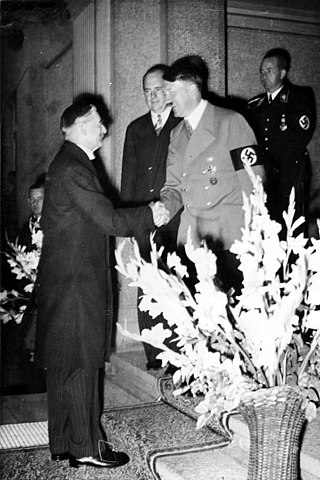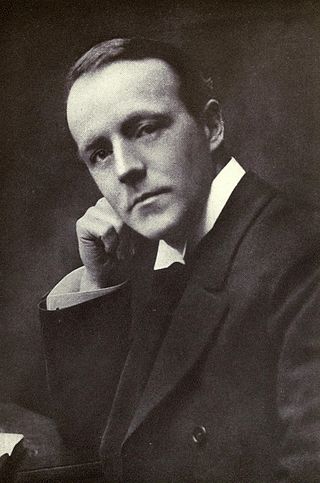Related Research Articles

Arthur Neville Chamberlain was a British politician who served as Prime Minister of the United Kingdom from May 1937 to May 1940 and Leader of the Conservative Party from May 1937 to October 1940. He is best known for his foreign policy of appeasement, and in particular for his signing of the Munich Agreement on 30 September 1938, ceding the German-speaking Sudetenland region of Czechoslovakia to Nazi Germany led by Adolf Hitler. Following the German invasion of Poland on 1 September 1939, which marked the beginning of the Second World War, Chamberlain announced the declaration of war on Germany two days later and led the United Kingdom through the first eight months of the war until his resignation as prime minister on 10 May 1940.

Appeasement, in an international context, is a diplomatic policy of making political, material, or territorial concessions to an aggressive power to avoid conflict. The term is most often applied to the foreign policy of the British governments of Prime Ministers Ramsay MacDonald, Stanley Baldwin and Neville Chamberlain towards Nazi Germany and Fascist Italy between 1935 and 1939. Under British pressure, appeasement of Nazism and Fascism also played a role in French foreign policy of the period but was always much less popular there than in the United Kingdom.

Edward Frederick Lindley Wood, 1st Earl of Halifax,, known as The Lord Irwin from 1925 until 1934 and The Viscount Halifax from 1934 until 1944, was a senior British Conservative politician of the 1930s. He held several senior ministerial posts during this time, most notably those of Viceroy of India from 1926 to 1931 and of Foreign Secretary between 1938 and 1940. He was one of the architects of the policy of appeasement of Adolf Hitler in 1936–1938, working closely with Prime Minister Neville Chamberlain. However, after Kristallnacht and the German occupation of Czechoslovakia in March 1939 he was one of those who pushed for a new policy of attempting to deter further German aggression by promising to go to war to defend Poland.
The National Labour Organisation, also known simply as National Labour, was formed in 1931 by supporters of the National Government in Britain who had come from the Labour Party. Its leaders were Ramsay MacDonald (1931–1937) and his son Malcolm MacDonald (1937–1945).

In the politics of the United Kingdom, a National Government is a coalition of some or all of the major political parties. In a historical sense, it refers primarily to the governments of Ramsay MacDonald, Stanley Baldwin and Neville Chamberlain which held office from 1931 until 1940.

Walter Runciman, 1st Viscount Runciman of Doxford, was a prominent Liberal and later National Liberal politician in the United Kingdom. His 1938 diplomatic mission to Czechoslovakia was key to the enactment of the British policy of appeasement of Nazi Germany preceding the Second World War.

Robert Hamilton Bernays was a Liberal Party and later Liberal National politician in the United Kingdom who served as a Member of Parliament (MP) from 1931 to 1945.
The 1938 Bridgwater by-election was a parliamentary by-election for the British House of Commons constituency of Bridgwater, Somerset held on 17 November 1938.

Ivor Roland Morgan Davies CBE was a British Liberal Party politician, journalist and United Nations Association administrator. Politically, his chief claim to fame was his decision in October 1938 to withdraw as Liberal candidate at the Oxford by-election along with the Labour candidate Patrick Gordon-Walker to allow an independent, Popular Front, anti-Munich candidate, A. D. Lindsay, the Master of Balliol, to challenge the government candidate Quintin Hogg.
The 1938 Lewisham West by-election was a parliamentary by-election held for the British House of Commons constituency of Lewisham West on 24 November 1938.
Joseph Alexander Leckie was a British Liberal, later Liberal National politician and leather manufacturer.
The 1938 Oxford by-election was a parliamentary by-election for the British House of Commons constituency of Oxford, held on 27 October 1938. The by-election was triggered when Robert Croft Bourne, the sitting Conservative Member of Parliament died on 7 August 1938. He had served as MP for the constituency since a 1924 by-election.
The 1941 Hampstead by-election was a by-election held for the British House of Commons constituency of Hampstead in London on 27 November 1941.

The 1922 Bodmin by-election was a parliamentary by-election for the British House of Commons. The constituency of Bodmin in Cornwall polled on 23 February 1922. The by-election was notable for the opposition Liberal Party gaining a seat from the Coalition-supporting Conservative Party.

Sir George Ernest Schuster was a British barrister, financier, colonial administrator and Liberal politician.

The European foreign policy of the Chamberlain ministry from 1937 to 1940 was based on British Prime Minister Neville Chamberlain's commitment to "peace for our time" by pursuing a policy of appeasement and containment towards Nazi Germany and by increasing the strength of Britain's armed forces until, in September 1939, he delivered an ultimatum over the invasion of Poland, which was followed by a declaration of war against Germany.

The 1938 Aylesbury by-election was a parliamentary by-election for the British House of Commons constituency of Aylesbury on 19 May 1938.
The Popular Front in the United Kingdom attempted an alliance between political parties and individuals of the left and centre-left in the late 1930s to come together to challenge the appeasement policies of the National Government led by Neville Chamberlain.
A Total and Unmitigated Defeat was a speech by Winston Churchill in the House of Commons at Westminster on Wednesday, 5 October 1938, the third day of the Munich Agreement debate. Signed five days earlier by Prime Minister Neville Chamberlain, the agreement met the demands of Nazi Germany in respect of the Czechoslovak region of Sudetenland.
Winston Churchill retained his UK Parliamentary seat at the 1929 general election as member for Epping, but the Conservative Party was defeated and, with Ramsay MacDonald forming his second Labour government, Churchill was out of office and would remain so until the beginning of the Second World War in September 1939. This period of his life has been dubbed his "wilderness years", but he was extremely active politically as the main opponent of the government's policy of appeasement in the face of increasing German, Italian and Japanese militarism.
References
- ↑ K J Dean, Town and Westminster: A Political History of Walsall from 1906-1945; Borough of Walsall, 1971 p169-170
- ↑ Who was Who, OUP 2007
- ↑ The Times, 8 June 1982 p12
- ↑ The Times, 9 November 1938 p9
- ↑ Dean, Town and Westminster; p 174
- ↑ Dean, Town and Westminster; p 173
- ↑ The Times, 16 November 1938 p8
- ↑ The Times, 14 November 1938 p19
- ↑ F W S Craig, British Parliamentary Election Results 1918-1949; Political Reference Publications, Glasgow 1949, p264
- ↑ Chris Cook & John Ramsden, By-elections in British Politics; UCL Press, 1997 p119